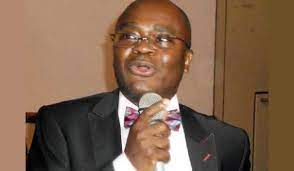Transportation expert and former Commissioner for Transportation in Lagos State, Dr Kayode Opeifa, has called on the National Assembly to fully take over the proposed introduction of annualized N1,000 tax on drivers for certificate of proof of ownership on vehicles nationwide.
In an exclusive telephone interview on Monday, 10 July, 2023, Opeifa, who is now an Executive Director, Centre for Sustainable Mobility and Access Development (CenSMAD),, described the proposed tax as “unwarranted” saying imposing such levy on hapless Nigerians would amount to double taxation and would go contrary to the spirit of the new administration which is bent on making live easy for Nigerians.
The Nation recalled that the Permanent Secretary Ministry of Transportation Abdulhafeez Toriola, had on Tuesday, 27 June, 2023 announced at a press conference that the Lagos State Government would in July begin the collection of the Proof of Ownership Certificates on all vehicles operating in the state, hinging the move on the need to ensure safety and security of lives and properties.
But Opeifa said there is no need for any new documentation or certification from the revenue board if only to generate data as listed above as the existing documentation and licences have such details and a new certificate would amount to mere duplication.
Describing the new tax as fraudulent and whimsical, Opeifa urged the National Assembly to take more than a passing interest in the matter before some people take Nigerians on another avoidable journey that would merely create new money bags.
According to him, “if the claims by the Corps Marshal of Federal Roads Safety Commission (FRSC) is correct, that over 12 million vehicle licences have been printed by the Corps since the integration of the new number plate in 2011, it means that the JTB decision would be looking at making a whopping N12 billion yearly from the issuance of the POC document, out of which the consultant alone would take about N2 to 3 billion, all 36 states and FCT N4 to 6billion and the rest of N2 -3bilion would go to the FRSC and the Federal Government who would take their profit before retiring the rest into the federation account.”
He said the National Council on Transportation (NCT), the advisory body on transportation, made up of Minister of Transportation, all state commissioners and permanent secretaries of Transportation and Ministries in charge of transportation, heads of all MDAs in the transportation and aviation ministries in Nigeria, the FRSC and headed by the Minister of Transportation could at best drive the initiative and not a revenue board whose only interest is only generating revenue and not the safety and security of the transportation sector.
Going by the size of vehicular count, only Lagos and Abuja stands a chance of getting something sizable from the proposed revenue to be generated by the new road tax, and even at that, no state would be able to collect N2 billion from that amount. At best Lagos would make N1.3 billion.
He explained that vehicle administration is purely a municipal matter, and not one that the Federal Government ought to administer the processes of issues relating to road tax for the purposes of generating internal revenue, adding that all issues for which the newly proposed tax is being premised are already catered for in the existing documentations that a motorists processed when ever he renews his vehicle paper.
“For me, this should be a one-time payment by a particular owner, except at transfer of ownership, in which case the new owner pay as it is currently,” he added, describing the new tax as pure impunity, even as he called on President Bola Tinubu not to fall for the gambit.
Opeifa said it is not true that Nigeria did not have a reliable national database for vehicles and drivers adding that such wild claims is indefensible because since 2012, when the new vehicle number plates were introduced nationwide, the FRSC has been mandated to be keeping the database and if there is any reason whatsoever to update that data base such could be done without resulting to taxing the masses.
“What needed to be done is for the FRSC to help all states to develop capacity to have reliable database, and this cannot be achieved with a new revenue drive which would be skewed against those states with capacity and not of any value to those without capacity to manage their internal vehicle administration challenges.


